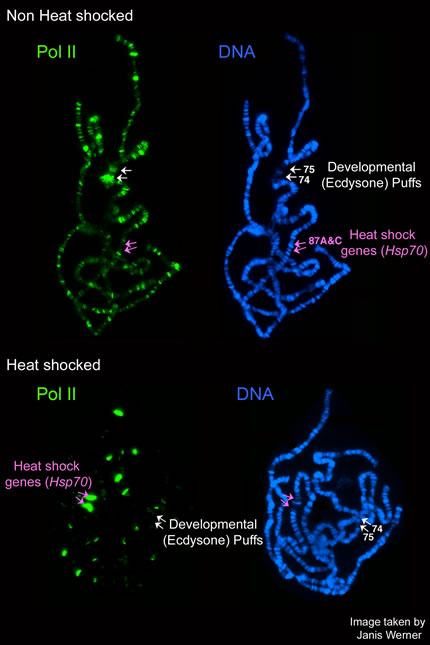 |
|
Chromatin Signatures & Gene Expression Karen Adelman, Ph.D.
Principal Investigator Tel (919) 541-0001 Fax (919) 541-0146 adelmank@niehs.nih.gov P.O. Box 12233 Mail Drop D4-02 Research Triangle Park, North Carolina 27709 Delivery Instructions Research SummaryThe Transcriptional Responses to the Environment Group investigates the dynamic interplay between signals from the extracellular environment and transcription by RNA polymerase II (Pol II). The ability to rapidly integrate multiple extra- and intra-cellular signals to produce a specific pattern of gene expression is essential for the growth, development and survival of all organisms; however, the mechanisms that generate these responses remain poorly understood. The group uses Drosophila and mice as model systems to study the alterations in epigenetic chromatin signatures and gene expression that occur when a cell receives specific signals from the environment (e.g. stress, immune challenge). By elucidating the fundamental basis for cellular responses to environmental insult, this work will provide critical insights into gene-environment interactions in the organism. 
Figure 1. Immunofluorescence of Drosophila polytene chromosomes reveals the dramatic changes in gene expression and chromatin structure that occur upon heat induction of the stress response. Pol II staining is shown in green and Hoechst staining of the DNA is in blue (image courtesy of John Lis).
The group has recently discovered that many genes that respond to stimuli are regulated differently than housekeeping genes. Prior to activation, Pol II is recruited to these genes and initiates RNA synthesis, but transcription elongation stalls within the first hundred nucleotides. Upon gene activation, this stalled Pol II is rapidly released from the promoter-proximal region into the gene, allowing for extremely efficient and robust RNA synthesis. This form of gene expression, called promoter-proximal pausing or stalling, had previously been described at the Drosophila heat shock genes, and the group’s recent results reveal that it is much more widespread than previously appreciated (Muse et al., Nat. Genet. 2007). The Transcriptional Responses to the Environment Group has also identified the Negative Elongation Factor complex (NELF) as a crucial player in regulating the duration of promoter-proximal stalling of Pol II at many genes, including developmentally-regulated genes and genes involved in the stress and innate immune responses (Gilchrist et al. Genes Dev. 2008). This molecular insight into NELF function has profound implications, because NELF has been shown to affect the expression of several ERα- and AP-1 dependent genes, proto-oncogenes and HIV RNA. The group is currently using expression analysis and cutting-edge ChIP-chip and ChIP-Seq techniques to identify promoter-proximal stalled polymerase genome-wide and is dissecting the role of NELF during cell differentiation, cell proliferation and the response to environmental exposures. Major areas of research:
Current projects:
Karen L. Adelman, Ph.D., leads the Transcriptional Responses to the Environment Group within the Laboratory of Molecular Carcinogenesis. She earned her Ph.D. in 1999 at Universite de Paris VI, working at the Institut Pasteur. She served as a postdoctoral fellow at Cornell in the laboratory of John Lis, Ph.D., before joining NIEHS in 2005. She has published 16 peer-reviewed articles in leading biomedical journals during her graduate and postdoctoral work. |
|

